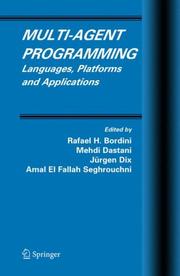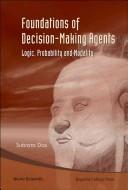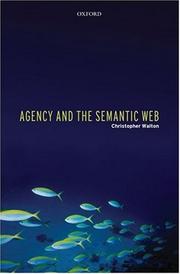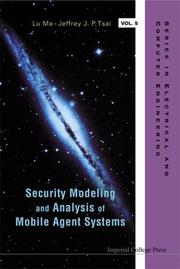| Listing 1 - 10 of 136 | << page >> |
Sort by
|
Book
ISBN: 953515916X 9533070897 Year: 2010 Publisher: IntechOpen
Abstract | Keywords | Export | Availability | Bookmark
 Loading...
Loading...Choose an application
- Reference Manager
- EndNote
- RefWorks (Direct export to RefWorks)
Multi agent systems involve a team of agents working together socially to accomplish a task. An agent can be social in many ways. One is when an agent helps others in solving complex problems. The field of multi agent systems investigates the process underlying distributed problem solving and designs some protocols and mechanisms involved in this process. This book presents a combination of different research issues which are pursued by researchers in the domain of multi agent systems.
Intelligent agents (Computer software) --- Agents, Autonomous (Computer software) --- Agents, Cognitive (Computer software) --- Agents, Intelligent (Computer software) --- Assistants, Cognitive (Computer software) --- Assistants, Intelligent software --- Autonomous agents (Computer software) --- Cognitive agents (Computer software) --- Cognitive assistants (Computer software) --- IAs (Computer software) --- Intelligent agent software --- Intelligent software agents --- Intelligent software assistants --- Software agents (Computer software) --- Special agents (Computer software) --- Artificial intelligence --- Computer programs
Book
ISBN: 6613556394 1280378484 9786613556394 1607508184 9781607508182 9781607508175 1607508176 9781280378485 Year: 2012 Publisher: Amsterdam Washington DC IOS Press
Abstract | Keywords | Export | Availability | Bookmark
 Loading...
Loading...Choose an application
- Reference Manager
- EndNote
- RefWorks (Direct export to RefWorks)
Seen by many as the next revolution in software development for large, complex, distributed systems, agent systems represent one of the more exciting research areas in computer science. With the development of powerful personal devices, the vision of a personal agent now seems increasingly appealing too. It can even be claimed that intelligent software agents will eventually become an essential part of Web 4.0. Software agents are finding their way into areas such as environmental security, climate change, seismic safety, epidemic prevention, detection and response, computer emergency response
Intelligent agents (Computer software) --- Agents, Autonomous (Computer software) --- Agents, Cognitive (Computer software) --- Agents, Intelligent (Computer software) --- Assistants, Cognitive (Computer software) --- Assistants, Intelligent software --- Autonomous agents (Computer software) --- Cognitive agents (Computer software) --- Cognitive assistants (Computer software) --- IAs (Computer software) --- Intelligent agent software --- Intelligent software agents --- Intelligent software assistants --- Software agents (Computer software) --- Special agents (Computer software) --- Artificial intelligence --- Computer programs --- Computer. Automation
Book
ISBN: 3031155653 3031155645 Year: 2022 Publisher: Cham, Switzerland : Springer,
Abstract | Keywords | Export | Availability | Bookmark
 Loading...
Loading...Choose an application
- Reference Manager
- EndNote
- RefWorks (Direct export to RefWorks)
Intelligent agents (Computer software) --- Agents, Autonomous (Computer software) --- Agents, Cognitive (Computer software) --- Agents, Intelligent (Computer software) --- Assistants, Cognitive (Computer software) --- Assistants, Intelligent software --- Autonomous agents (Computer software) --- Cognitive agents (Computer software) --- Cognitive assistants (Computer software) --- IAs (Computer software) --- Intelligent agent software --- Intelligent software agents --- Intelligent software assistants --- Software agents (Computer software) --- Special agents (Computer software) --- Artificial intelligence --- Computer programs
Book
ISBN: 9811933588 9811933596 Year: 2022 Publisher: Singapore : Springer Nature Singapore Pte Ltd.,
Abstract | Keywords | Export | Availability | Bookmark
 Loading...
Loading...Choose an application
- Reference Manager
- EndNote
- RefWorks (Direct export to RefWorks)
Intelligent agents (Computer software) --- Distributed artificial intelligence --- Agents, Autonomous (Computer software) --- Agents, Cognitive (Computer software) --- Agents, Intelligent (Computer software) --- Assistants, Cognitive (Computer software) --- Assistants, Intelligent software --- Autonomous agents (Computer software) --- Cognitive agents (Computer software) --- Cognitive assistants (Computer software) --- IAs (Computer software) --- Intelligent agent software --- Intelligent software agents --- Intelligent software assistants --- Software agents (Computer software) --- Special agents (Computer software) --- Artificial intelligence --- Computer programs
Book
ISBN: 3031229479 3031229460 Year: 2023 Publisher: Cham, Switzerland : Springer International Publishing,
Abstract | Keywords | Export | Availability | Bookmark
 Loading...
Loading...Choose an application
- Reference Manager
- EndNote
- RefWorks (Direct export to RefWorks)
This book constitutes the thoroughly refereed and revised selected papers from the 22nd International Workshop on Multi-Agent-Based Simulation, MABS 2022, which took place virtually during May 8–9, 2022. The conference was originally planned to take place in Auckland, New Zealand, but had to change to an online format due to the COVID-19 pandemic. The 11 papers included in these proceedings were carefully reviewed and selected from 17 submissions. They focus on finding efficient solutions to model complex social systems, in areas such as economics, management, organisational and social sciences in general.
Computer simulation --- Intelligent agents (Computer software) --- Agents, Autonomous (Computer software) --- Agents, Cognitive (Computer software) --- Agents, Intelligent (Computer software) --- Assistants, Cognitive (Computer software) --- Assistants, Intelligent software --- Autonomous agents (Computer software) --- Cognitive agents (Computer software) --- Cognitive assistants (Computer software) --- IAs (Computer software) --- Intelligent agent software --- Intelligent software agents --- Intelligent software assistants --- Software agents (Computer software) --- Special agents (Computer software) --- Artificial intelligence --- Computer programs

ISBN: 128031205X 9786610312054 0387263500 0387245685 9780387263502 Year: 2005 Publisher: Boston, MA Springer Science+Business Media, Inc.
Abstract | Keywords | Export | Availability | Bookmark
 Loading...
Loading...Choose an application
- Reference Manager
- EndNote
- RefWorks (Direct export to RefWorks)
Multi-Agent Programming is an essential reference for anyone interested in the most up-to-date developments in MAS programming. Programmers, researchers, and graduate students will find this text unique in its presentation of the concepts and principles of this fast-growing field. While previous research has focused on the development of formal and informal approaches to analyse and specify Multi-Agent Systems, this book focuses on the development of programming languages and tools which not only support MAS programming, but also implement key concepts of MAS in unified frameworks. Part I describes four approaches that are based on computational logic or process algebra--Jason, 3APL, IMPACT, and CLAIM/SyMPA. These programming languages have formal semantics and use heavy machinery based on formal methods, but also provide working platforms for the development of multi-agent systems. Part II presents agent languages and platforms that extend or are based on Java--JADE, Jadex, and JACKTM. Although these have no formal semantics, the languages are well documented and the platforms provide a variety of tools that have been extensively used in practice. Part III provides two significant industry specific applications--The DEFACTO System for coordinating human-agent teams for the future of disaster response, and the ARTIMIS rational dialogue agent technology. The book also features seven appendices, summarising each of the agent programming languages, hence facilitating comparison of the approaches. In particular, Appendix A describes the criteria used for comparing the agent languages and platforms.
Intelligent agents (Computer software) --- Computer software --- System design. --- Development. --- Design, System --- Systems design --- Electronic data processing --- System analysis --- Development of computer software --- Software development --- Agents, Autonomous (Computer software) --- Agents, Cognitive (Computer software) --- Agents, Intelligent (Computer software) --- Assistants, Cognitive (Computer software) --- Assistants, Intelligent software --- Autonomous agents (Computer software) --- Cognitive agents (Computer software) --- Cognitive assistants (Computer software) --- IAs (Computer software) --- Intelligent agent software --- Intelligent software agents --- Intelligent software assistants --- Software agents (Computer software) --- Special agents (Computer software) --- Artificial intelligence --- Computer programs

ISBN: 9812779833 9786611938161 1281938165 9812779841 9789812779847 9781281938169 9789812779830 Year: 2008 Publisher: Singapore Hackensack, NJ [London] World Scientific Imperial College Press
Abstract | Keywords | Export | Availability | Bookmark
 Loading...
Loading...Choose an application
- Reference Manager
- EndNote
- RefWorks (Direct export to RefWorks)
This self-contained book provides three fundamental and generic approaches (logical, probabilistic, and modal) to representing and reasoning with agent epistemic states, specifically in the context of decision making. Each of these approaches can be applied to the construction of intelligent software agents for making decisions, thereby creating computational foundations for decision-making agents. In addition, the book introduces a formal integration of the three approaches into a single unified approach that combines the advantages of all the approaches. Finally, the symbolic argumentation approach to decision making developed in this book, combining logic and probability, offers several advantages over the traditional approach to decision making which is based on simple rule-based expert systems or expected utility theory.
BUSINESS & ECONOMICS --- Decision-Making & Problem Solving --- Intelligent agents (Computer software) --- Engineering & Applied Sciences --- Computer Science --- Artificial intelligence --- Computer programs. --- Agents, Autonomous (Computer software) --- Agents, Cognitive (Computer software) --- Agents, Intelligent (Computer software) --- Assistants, Cognitive (Computer software) --- Assistants, Intelligent software --- Autonomous agents (Computer software) --- Cognitive agents (Computer software) --- Cognitive assistants (Computer software) --- IAs (Computer software) --- Intelligent agent software --- Intelligent software agents --- Intelligent software assistants --- Software agents (Computer software) --- Special agents (Computer software) --- Computer programs --- E-books

ISBN: 0262112647 026227759X 0585437173 9780262112642 9780262277594 9780585437170 0262292866 Year: 2001 Publisher: Cambridge, Mass. MIT Press
Abstract | Keywords | Export | Availability | Bookmark
 Loading...
Loading...Choose an application
- Reference Manager
- EndNote
- RefWorks (Direct export to RefWorks)
"As computers advance from isolated workstations to linked elements in complex communities of systems and people, cooperation and coordination via intelligent agents become increasingly important. Examples of such communities include the Internet, electronic commerce, health institutions, electricity networks, and digital libraries. Sarit Kraus is concerned here with the cooperation and coordination of intelligent agents that are self-interested and usually owned by different individuals or organizations. Conflicts frequently arise, and negotiation is one of the main mechanisms for reaching agreement. Kraus presents a strategic-negotiation model that enables autonomous agents to reach mutually beneficial agreements efficiently in complex environments. The model, which integrates game theory, economic techniques, and heuristic methods of artificial intelligence, can be automated in computer systems or applied to human situations. The book provides both theoretical and experimental results."
Intelligent agents (Computer software) --- Engineering & Applied Sciences --- Computer Science --- 681.3*I2 --- Artificial intelligence. AI --- 681.3*I2 Artificial intelligence. AI --- Agents, Autonomous (Computer software) --- Agents, Cognitive (Computer software) --- Agents, Intelligent (Computer software) --- Assistants, Cognitive (Computer software) --- Assistants, Intelligent software --- Autonomous agents (Computer software) --- Cognitive agents (Computer software) --- Cognitive assistants (Computer software) --- IAs (Computer software) --- Intelligent agent software --- Intelligent software agents --- Intelligent software assistants --- Software agents (Computer software) --- Special agents (Computer software) --- Artificial intelligence --- Computer programs --- E-books --- COMPUTER SCIENCE/Robotics & Agents

ISBN: 0191917699 1280845236 0191537756 1429459522 9780191537752 9781429459525 9781280845239 9786610845231 6610845239 0199292485 9780199292486 Year: 2007 Publisher: Oxford Oxford University Press
Abstract | Keywords | Export | Availability | Bookmark
 Loading...
Loading...Choose an application
- Reference Manager
- EndNote
- RefWorks (Direct export to RefWorks)
The author looks at the construction of the Semantic Web, which enables computers to automatically and independently consume Web-based information.
Intelligent agents (Computer software) --- Semantic Web. --- Semantic integration (Computer systems) --- Semantic networks (Information theory) --- World Wide Web --- Microformats --- Agents, Autonomous (Computer software) --- Agents, Cognitive (Computer software) --- Agents, Intelligent (Computer software) --- Assistants, Cognitive (Computer software) --- Assistants, Intelligent software --- Autonomous agents (Computer software) --- Cognitive agents (Computer software) --- Cognitive assistants (Computer software) --- IAs (Computer software) --- Intelligent agent software --- Intelligent software agents --- Intelligent software assistants --- Software agents (Computer software) --- Special agents (Computer software) --- Artificial intelligence --- Computer programs --- Semantic Web --- E-books --- Semantic web --- Acqui 2006

ISBN: 1281347558 9786611347550 1860949053 9781860949050 9781860946349 1860946348 9781281347558 6611347550 Year: 2006 Volume: v. 5 Publisher: London ; Hackensack, NJ : Imperial College Press,
Abstract | Keywords | Export | Availability | Bookmark
 Loading...
Loading...Choose an application
- Reference Manager
- EndNote
- RefWorks (Direct export to RefWorks)
A mobile agent system could be attacked by malicious agents, platforms and third parties. Mobile agents simply offer greater opportunities for abuse and misuse, which broadens the scale of threats significantly. In addition, since mobile agents have some unique characteristics such as their mobility, security problems have become more complicated in these systems. These security problems have become a bottleneck in the development and maintenance of mobile agent systems, especially in security sensitive applications such as electronic commerce. This book introduces the concept and structure o
Mobile agents (Computer software) --- Intelligent agents (Computer software) --- Agents, Autonomous (Computer software) --- Agents, Cognitive (Computer software) --- Agents, Intelligent (Computer software) --- Assistants, Cognitive (Computer software) --- Assistants, Intelligent software --- Autonomous agents (Computer software) --- Cognitive agents (Computer software) --- Cognitive assistants (Computer software) --- IAs (Computer software) --- Intelligent agent software --- Intelligent software agents --- Intelligent software assistants --- Software agents (Computer software) --- Special agents (Computer software) --- Artificial intelligence --- Agents, Mobile (Computer software) --- Mobile Internet agents (Computer software) --- Computer programs --- E-books
| Listing 1 - 10 of 136 | << page >> |
Sort by
|

 Search
Search Feedback
Feedback About UniCat
About UniCat  Help
Help News
News